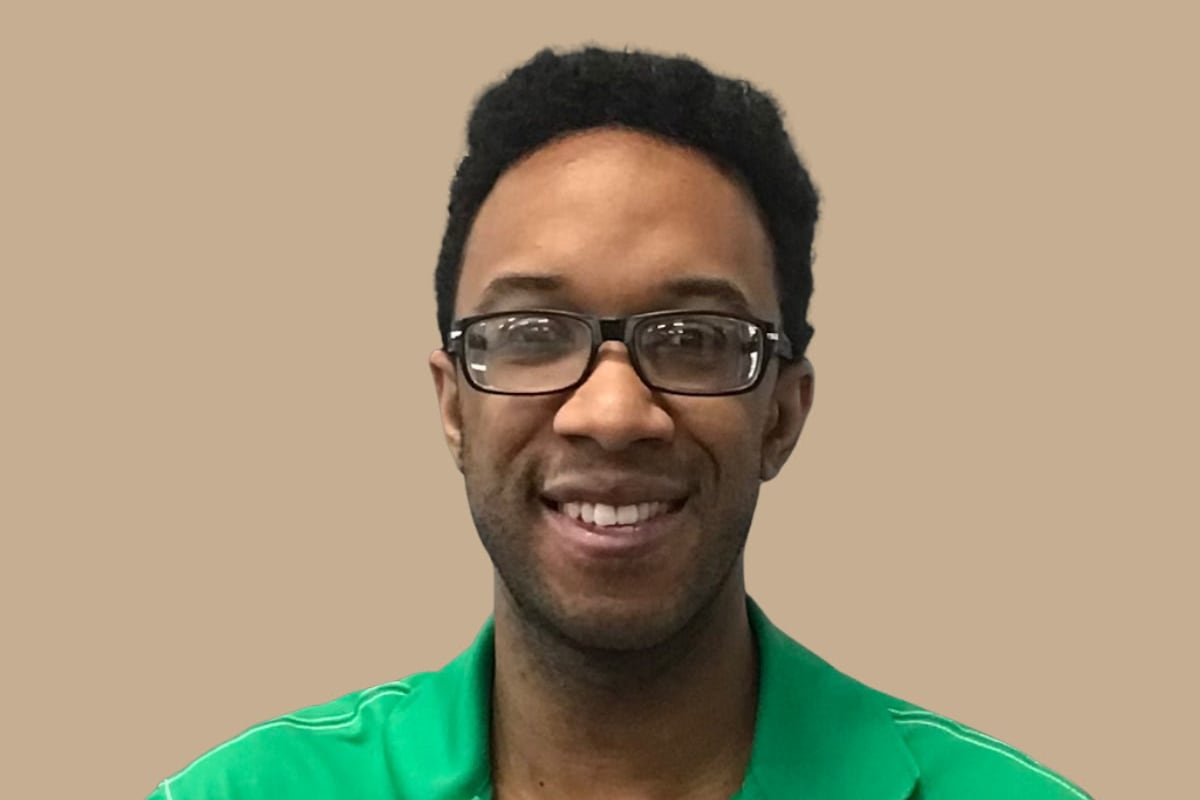Not all of Reggie Spears’ music students will continue to play the instruments he teaches them when they leave his class.
But what Spears, who teaches instruments as diverse as the flute and xylophone to elementary school students, really wants the young people to know that excitement and support can take you a long way. “You may be off beat, you may be singing terrible,” said Spears, who teaches at Bronzeville Classical Elementary in Chicago’s Bronzeville neighborhood. “But the enthusiasm permeates all of my students. Me being supportive of my students and then requiring that they be supportive of each other is success.”
That was especially important for Spears when he had to transition to teaching music remotely. “The biggest thing I learned is that I can be adaptable,” said Spears, a finalist for the 2021 Golden Apple Award for Excellence in Teaching. He spoke recently with Chalkbeat about how music education can help heal trauma, what instrument he plays when he needs a “brain break,” and how to create music fans for life.
How do you get to know your students?
It is quite challenging to get to know students in music class because, generally, I only see the students for an hour and at most two times per week. I really get to know the students through after-school programs. I have always taught at least a band program, a choir and a theater club at every school I’ve been at and that is the best way to learn students personalities and to really connect with them.
Tell us about a favorite lesson to teach. Where did the idea come from?
My favorite lesson to teach each year is probably my first grade unit on instruments of the band and orchestra. We spend several weeks discussing the instrument families and how these different instruments produce a sound and why they all sound different. Each time I introduce a new instrument, I ask the students to brainstorm and tell me how to play the instruments, and it’s such an engaging lesson for them to work out how a clarinet or trumpet is played. The lesson came from a need to teach the student about traditional instruments in order to teach larger concepts of ensemble, sound production, and make them more well-rounded consumers of music.
What object would you be helpless without during the school day?
The piano is a versatile tool in my teaching arsenal. It allows me to demonstrate musical concepts across topics, it is an attention getter and classroom-management tool, it allows me to perform with the students while they play their instruments, and it gives a real performance feel to the topics we are rehearsing. Most importantly it is my own personal escape. When there are no students and I need a brain break and stress reliever, I can sit at the piano and play and practice.
Tell us about a memorable time — good or bad — when contact with a student’s family changed your perspective or approach.
My first school was in the Uptown neighborhood and I had a lot of students that were dealing with trauma. I had a clarinet player who, before joining band, had impulse-control issues and would lash out verbally at students and staff, but she loved playing clarinet and coming to the band. One particular day at the end of band rehearsal, another student, who was just being playful, did the wrong thing to my clarinet player and she exploded with rage — saying things like ‘I hate band, nobody needs this anyway.’ After the other band members had left, I pulled her to the side and asked if she really wanted to quit band. She said no, and we had a discussion about how to not let people push your buttons because that’s what they want. When you get angry, they win. Just then her mom came in to pick her up, Seeing that she was upset, the mother asked what was wrong. The student explained what had happened and then the mother said, “Well you don’t let anyone talk to you like that; if they do something you don’t like you yell right back at them.” It broke my heart to hear her mother negate all the quality social-emotional work we had done. I learned then that it is so important to get family and parents involved with the education of a student because I only have influence over them for 6.25 hours per day.
What part of your job is most difficult?
Internalizing the trauma of students who can’t or don’t know how to deal with it themselves.
Recommend a book that has helped you a better teacher, and why.
Harry Wong’s “The First Days of School.” This book was and is my everything for classroom management. It is clear, concise, and works across grade levels and content areas.
What’s the best advice you’ve received about teaching?
Be best friends with the clerk and the custodial staff/engineer and your school. The clerk is the nervous system of the school. They always know all the families and what may be happening within those families and can give a great insight on why students are behaving in a certain way. They have all the contacts for vendors and they handle your money and the school’s money, and in an arts program, funding is crucial.
The custodial staff and engineer have all the keys. I can’t count the number of times I’ve needed to get into the school during non-school hours or have asked to stay late in the building while the custodial staff does their work long after students have left.
What makes teaching music different from other subjects? Why is it important?
I tell my students all the time that music is unique because it encompasses all the subjects at once. It is literacy, math, science, history. It’s physical and emotional. It’s interpersonal and intrapersonal. You can enjoy and play music for your entire life. Music is important because it allows you to not only have the structure and analytical nature of math and science but also the creativity and interpretational nature of literature.
What have you learned teaching music through the pandemic, either about your students, teaching or yourself?
I’ve learned that students are resilient. They want to learn, and they love school and want to be here. I learned that teaching is never a given. What you have been doing for 12 years may become upended in a moment and you must be adaptable at all times. I learned that technology is my best friend and although I used lots of technology before, I need to utilize it more than I was. I learned that it’s OK to give myself grace, that I don’t have to have the right or best answers all the time. I may need to be challenged and stressed to push myself to be better than I thought I could be.








